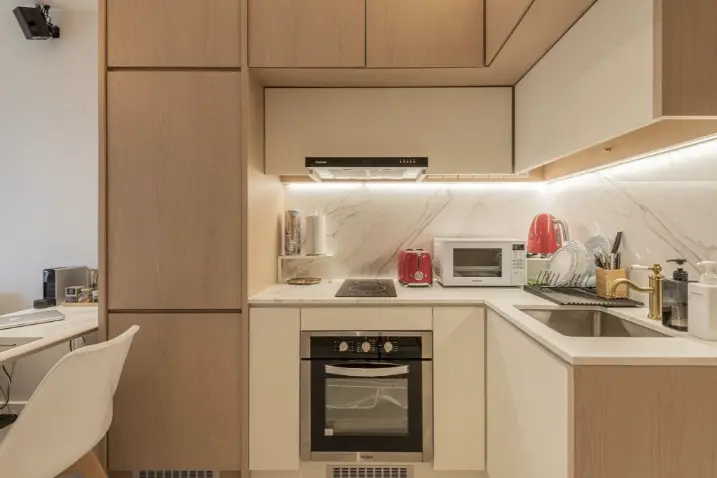Home renovation projects represent a significant investment for homeowners, both in terms of time and resources. These ventures are often embarked upon to transform a living space, enhance comfort, or increase the property’s value. However, successful execution requires thoughtful planning and careful consideration of various factors to ensure that the outcome aligns with the homeowner’s expectations and lifestyle needs.
The importance of these renovation projects extends beyond mere aesthetics, as they also directly impact the functionality of the home and the quality of life for its inhabitants. In this guide, we will discuss the seven key considerations every homeowner should keep in mind during a home renovation project, providing practical advice to navigate this complex process for a rewarding end result.
1. Professional Help

When you think of home renovation, working with professionals is a must. This is especially true when it comes to ensuring your comfort during the hot summer months. There are many ways a professional can help you here. For instance, you can Enjoy seamless AC installation from experts, which will also be affordable. Not to mention, these professionals are dedicated to ensuring you experience maximum comfort and cooling efficiency.
Be sure to vet the contractors or designers before bringing them on board. Look at their portfolio and read reviews from previous clients to make an informed decision. Also, ensure that they are licensed, insured, and have the necessary permits to carry out the work. Whether you are thinking of hiring Edinburgh double glazing experts or you want to redo your kitchen, entrusting the right professionals to handle your project is crucial.
They will not only have the expertise and technical know-how but also provide you with valuable insights and recommendations that can save you time and money in the long run. Not only will professionals ensure high-quality work, but they can also navigate potential challenges and provide solutions to mitigate risks. Even though it may seem like an additional expense, the value of professional help during a home renovation project cannot be overstated.
2. Budget
This will serve as a guideline when making decisions on materials, design, and labor costs. Always include a contingency for unforeseen expenses. When setting a budget, it is essential to consider the return on investment (ROI) of the renovation project. While some renovations can significantly increase the value of a home, others may not provide a high ROI. It is crucial to weigh the potential ROI against your budget and personal preferences before making any final decisions.
Furthermore, most homeowners tend to have a budget that is less than what the project actually ends up costing. To avoid this, get multiple quotes from different contractors and compare them before finalizing your budget Expect to spend anything between 10-25% more than your initial budget.
3. Timeline
Develop a realistic timeline and factor in potential delays like material shortages or permit approval. Renovation projects can be disruptive to daily life, so it is essential to plan accordingly and set realistic expectations. Be sure to communicate clearly with your contractor about the timeline and any changes that may occur during the project. Keep in mind that hurrying a renovation project can result in poor workmanship or costly mistakes.
For example, rushing a paint job can result in uneven or streaky walls, which would require time and resources to fix. So it is crucial to allow enough time for each stage of the renovation project. Most importantly, be patient and trust the process to ensure a successful outcome.
4. Design and Functionality

Consider how changes will affect the day-to-day usage of your space. For instance, a home office may seem like a great idea, but if it takes up valuable living space and makes the house feel smaller, it may not be worth it in the long run. Think about your lifestyle and needs when making design decisions. Additionally, consider incorporating energy-efficient features or universal design elements to improve functionality and future-proof your home.
For example, installing double-glazed windows can significantly reduce energy costs and improve insulation in your home. These features may require a higher initial investment but can result in long-term savings and increased property value. However, be sure to balance functionality and design, as the ultimate goal is to create a space that is both functional and aesthetically pleasing.
5. Permits and Regulations
Failure to comply can result in costly fines and delays. Depending on the scope of your renovation project, you may need to obtain permits from your local municipality. These regulations are in place to ensure that the work is done safely and up to code. It is crucial to research and understand these requirements before beginning any renovations, as they can vary by location and type of project.
Additionally, if you live in a homeowners’ association (HOA), be sure to check their rules and regulations as well. Failure to comply with HOA regulations can result in additional fines or even legal action. For peace of mind and to avoid any potential setbacks, it is essential to stay on top of all necessary permits and regulations.
6. Living Arrangements
If it’s going to be noisy, dusty, or inconvenient, you might want to plan for temporary accommodation. In some cases, homeowners can live in a different part of the house while renovations are ongoing. However, for larger projects, it may be necessary to seek temporary housing arrangements. It is essential to plan and budget for these living arrangements before beginning any renovation work.
If possible, try to schedule renovations during less busy times of the year when there are more affordable options for temporary accommodation. For example, if you are renovating your outdoor space, it may be easier to plan for temporary housing during the summer months when there are more affordable options available.
7. Long-term Value
Lastly, consider how the renovations would add to the long-term value of your home, especially if you plan to sell in the future. Some renovations have a higher return on investment than others. It is essential to do your research and consult with professionals before making any decisions. Additionally, be sure to prioritize necessary renovations over cosmetic upgrades. For example, fixing a leaking roof or upgrading outdated plumbing may not be as glamorous as a kitchen remodel, but they are crucial for maintaining the value of your home in the long run.
Conclusion
In conclusion, tackling a home renovation project can seem daunting, but with the right approach and considerations, it can be a rewarding experience. By keeping these seven key factors in mind, homeowners can make informed decisions to ensure successful outcomes for their renovation projects. Remember to seek professional help, set a realistic budget and timeline, consider design and functionality, obtain necessary permits and comply with regulations, plan for living arrangements, and prioritize long-term value. With thorough planning and careful consideration, a home renovation project can transform a living space into a dream home that not only meets but exceeds expectations.
